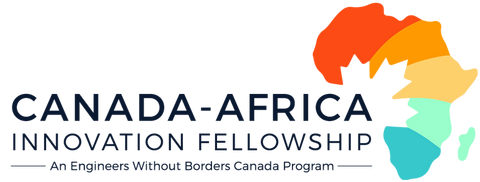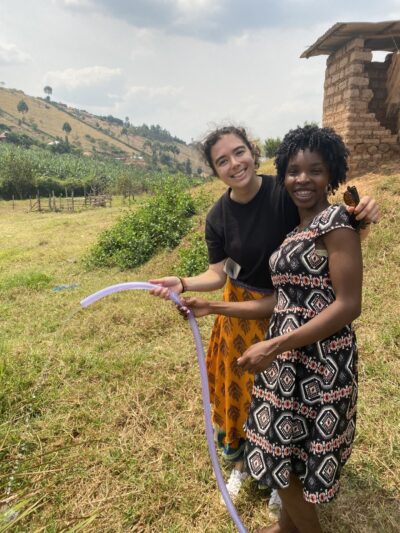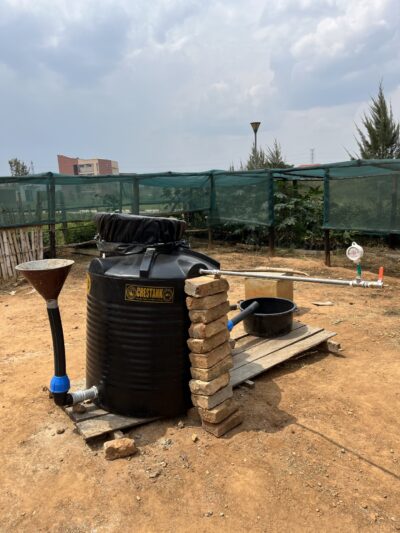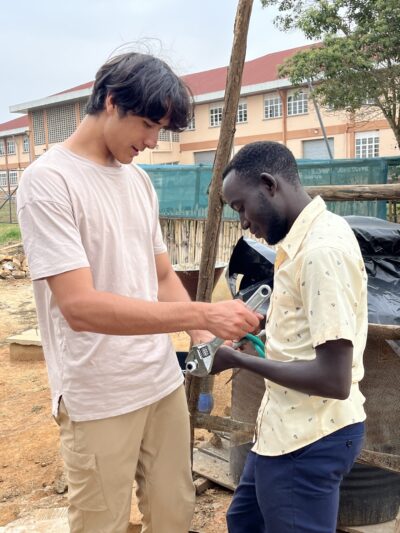International Ingenuity: Solar & Biogas Feats in Uganda
Nick Arcuri
Benjamin Pyun & Vitoria Houston
When you need to solve a complex global problem, you ask an engineer for help.
For Vitoria Houston, a recent mechanical engineering graduate, and Benjamin Pyun, a current aerospace engineering student, their dreams of supporting a global engineering initiative in Africa became a reality this past summer.
The Canada-Africa Innovation Fellowship
Made possible by Engineers Without Boarders (EWB) Canada, in association with the Mbarara University of Science and Technology (MUST) in Uganda, Vitoria and Ben participated in a 3-month program called the Canada-Africa Innovation Fellowship (CAIF). Since 2021, CAIF has brought together students from leading engineering programs around the world to offer solutions to climate change problems.

Students participate in a series of learning labs to create and accelerate ideas to build a sustainable and inclusive future. This includes mentorship and coaching from experts, opportunities for students to grow their leadership, entrepreneurial and innovation capacities while engaging in cultural, academic and professional exchange.
As the Carleton University representatives, Vitoria and Benjamin were part of the 7 students from Canadian universities who had the opportunity to work with 8 students from MUST to build a prototype of a portable solar water pump for the rural community of Nyakayojo, Uganda.

Learning About the Nyakayojo Community
The Nyakayojo Division is one of the six administrative divisions that make up the Mbarara Municipality, in south-western Uganda. The students were able to meet with the community members and speak with them about their concerns before starting the project.
Many community members expressed worries about the climate, such as their dryer seasons becoming increasingly drier and warmer and their wetter seasons becoming more extreme and unpredictable with rainfall. Since Uganda relies on small family-owned farms for produce and profits, the effects of climate change had direct impacts on the people and infrastructure of the country.
Tasked to identify solutions, the 15 students (referred to as fellows) were separated into 3 groups of 5. These groups consisted of animal health, solar energy, and biogas technology (broken down animal waste in the absence of oxygen to create renewable fuel) teams.
Vitoria joined the solar technology team as the mechanical engineering and design lead and Benjamin participated on the biogas technology team. They then had the opportunity to speak directly with community members before tackling the project head-on.
“We were able to learn a lot about the socio-economic context of Uganda, and the importance that engineering and innovation hold,” said Benjamin Pyun. “Gathering feedback from members of rural communities in Uganda and developing engineering solutions to their issues related to climate change gave both Vitoria and I a lot of insight on the engineering process and it was nice to be able to work on such a project outside of the classroom context!”
The Experience
Between the practical experience of drafting constant progress reports, aligning, and operating within set budgets, developing ideas, and applying the engineering design process, both Vitoria and Benjamin were able to carry forward the teachings of their engineering programs and turn their learnings into tangible outcomes.

“Through our projects, Benjamin and I were able to learn the importance of budgeting in an engineering project, as well as the importance of iterations in the development of a prototype,” said Vitoria.
Vitoria and Benjamin also had the opportunity to unlearn Western ways of knowing and doing as CAIF fellows. By working with MUST students and community members from diverse backgrounds, they were able to broaden their global understandings and ways of working.
“Benjamin and I quickly realized when beginning to work in our respective teams that we were approaching our conversations with a Canadian mentality and not understanding how we could adapt our approach to fit the Ugandan culture. It was an insightful experience for us that we needed to participate as equals rather than leaders and followers.”

Project Impact
After consulting with their teams and the community of Nyakayojo, Vitoria and Benjamin became clear on the roots of the challenges, which then launched both teams to set off on their respective goals; creating a portable, solar panel powered water pump and cost effective, user-friendly, and minimal maintenance biogas digesters.
The solar panel powered water pump was designed compact enough to fit in a lightweight backpack, all while addressing the issue of gathering water from nearby water sources and transportation to existing community water tanks in proximity to their properties. This allowed for community members and farm owners to properly tend to their crops, maintain healthy plantations, and provide a prosperity of food for the entire community during dry seasons, virtually eliminating crop scarcity.
The prototype biogas digesters that the biogas team developed tackled the on-going issues the community faced by capitalizing on sourcing readily available materials, crafting a complimentary manual providing basic knowledge about biogas digesters, maintenance, and guides on the overall construction and what materials to source. It paved the way for more autonomy for members of the community, more education, and less dependence on external organizations.
Participating in the first-hand development of these engineering projects taught Vitoria and Benjamin how important these pieces of technology are in climates that are not as common in the western world. The negative effects of the western world’s actions with on-going climate change hold major consequences for continents like Africa.
“I’m proud to be part of a project that will have a lifetime of impact,” said Benjamin.
How Carleton Engineering Prepared Students for Real-World Impact
Converting the information from lectures, projects and student clubs, and applying it to real-world situations can really ignite the way students feel about their chosen career path. CAIF was no different. As Benjamin and Vitoria delivered on their projects during their fellowship, it was evident that what they learned as Carleton engineering students had profound impact in their work with the Nyakayojo community.
“For example, learning about losses in pipe flow in fluid mechanics classes allowed Vitoria to make calculations for the design of the solar team’s water pump. Through my thermodynamics classes, I was able to better understand the energy produced during the combustion of methane, which helped in the design process of our biogas digester,” said Benjamin.
“Experience acquired through participation in clubs and design teams, such as my experience working on the Legacy Project, which is related to biogas technology, with the Carleton Chapter of Engineers Without Borders helped me come prepared with basic a basic understanding of biogas technology and its applications and importance in the global context. Vitoria’s practical experience working on design projects through many clubs such as the concrete canoe club helped her maintain an organized project. I’m thankful my experience at Carleton prepared me for this great initiative. I will always remember my time in Uganda.”